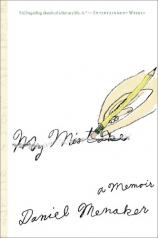My Mistake: A Memoir
Review
My Mistake: A Memoir
If you have read any of Alice Munro’s New Yorker stories from the 1980s or enjoyed the novel PRIMARY COLORS, then you are familiar with the work of Daniel Menaker. His 26 years at the magazine, followed by 12 years as an editor at Random House and HarperCollins, form the spine of this charming memoir. At its heart, however, lies the story of how one intelligent and sensitive man has carried on with patient good humor in the face of an ample share of what life hands out in the way of both sadness and joy.
MY MISTAKE (the term becomes something of a mantra, like Kurt Vonnegut’s “so it goes”) is organized in brief, chronological sections that begin at age three months and end at 71, in 2012. Menaker, possessed of what he calls a “rich and strange family history,” grew up in Greenwich Village, in a family of decidedly leftward political leanings. He began his schooling at the Little Red School House, the “very progressive private school on Bleecker Street.” Summers at a Massachusetts guest camp run by his Uncle Enge (Frederick Engels Menaker) furthered his political education.
There are only passing references here to Menaker’s wife, the writer and former New York Times editor Katherine Bouton, or to his two adopted children. Instead, the defining aspect of his family life was the relationship with his charismatic brother Mike, three years his senior. “I can’t imagine any other brothers’ competition being fiercer. It was like a project, an enterprise that we felt obliged to sustain.” That competition ended tragically, when Mike was 29, following surgery for an injury Menaker says, with no hint of doubt, “I caused.” Readers can judge for themselves the truth of that statement, but Menaker describes a lifetime of analysis he has undergone trying to come to terms with that early loss.
“[Menaker’s] 26 years at [The New Yorker], followed by 12 years as an editor at Random House and HarperCollins, form the spine of this charming memoir. At its heart, however, lies the story of how one intelligent and sensitive man has carried on with patient good humor in the face of an ample share of what life hands out in the way of both sadness and joy.”
What’s most striking about Menaker’s magazine career that began when he was 27, in the “brilliant crazy house” he calls The New Yorker, is that most of it occurred after he was told, by then-executive editor Robert Bingham, to “look for another job.” His “firing” took place after he protested the refusal to accept one of his copyedits to William Shawn, the magazine’s idiosyncratic editor for more than 30 years and someone with whom Menaker had a prickly relationship from the beginning of his career as a fact checker. He views the six-year editorial reign of Tina Brown with bemused detachment, describing her as “smart but mercurial.” (His proof: her hilarious schizophrenic reaction to Alice Munro’s story “The Albanian Virgin” from the time he first presented it to its inclusion in the magazine’s first fiction issue.)
In contrast, Menaker, himself the author of two short story collections and a novel, had a warm and enduring relationship with famed New Yorker fiction editor William Maxwell (a man he calls his “fourth father”). Maxwell accepted Menaker’s first short story and conditioned his own departure from the publication on Shawn’s agreement to promote the younger man to fiction editor, where he edited a glittering list of writers that included Isaac Bashevis Singer, William Trevor and dozens of younger stars over nearly two decades.
Menaker moved to Random House as senior literary editor in 1995, a job opportunity he chalks up to collusion between Brown and her husband, Harold Evans, then publisher of the Random House Publishing Group. Pointing out that some “four out of every five books published lose money,” Menaker goes on to present some sobering, if somewhat fanciful, statistics to support his argument that publishing is “kind of a grand cultural roulette, in which your chances of winning any significant pot are very small.” His brief account of the fight he waged to have the author of PRIMARY COLORS remain “Anonymous” should be enough to persuade anyone of the cutthroat quality of life inside a contemporary publishing house.
From diabetes to Graves’ disease to lung cancer, diagnosed when Menaker was 66 and recurring three years later, the last seven years have seen him dogged by serious health issues. What he calls the Great Temporariness, life’s evanescent quality, “has swung around from being a dark sidekick to a face-to-face superior who will no longer tolerate my disregard.” And yet, revealed by wry statements like that one, the pages of this memoir are replete with persuasive evidence that life’s chill winds haven’t robbed Menaker of his graceful good humor.
While working on the book in 2011, he had the opportunity to revisit The New Yorker’s archives from the years 1969 through 1984. He soon abandoned that excavation of his past, convinced that “in enterprises like this, facts have as much and (more important) as little bearing on the truth as memory does.” Instead, recognizing the “radical contingencies, the happenstances, that you know have determined so many aspects of your life,” he makes an admirable effort, and often succeeds, finding the “patterns and through-lines.” Recently the recipient of his fourth “clean” CT scan, he concludes this lively and life-affirming book by observing, “I have never seen better days. No mistake.” Any reader will hope he’s absolutely correct about that.
Reviewed by Harvey Freedenberg on November 22, 2013
My Mistake: A Memoir
- Publication Date: November 4, 2014
- Genres: Nonfiction
- Paperback: 256 pages
- Publisher: Mariner Books
- ISBN-10: 0544334531
- ISBN-13: 9780544334533





